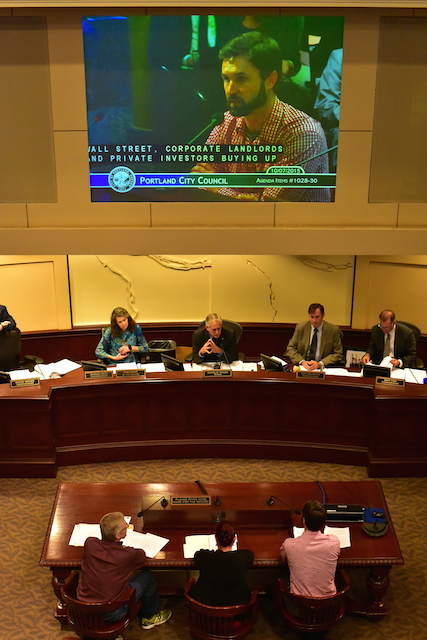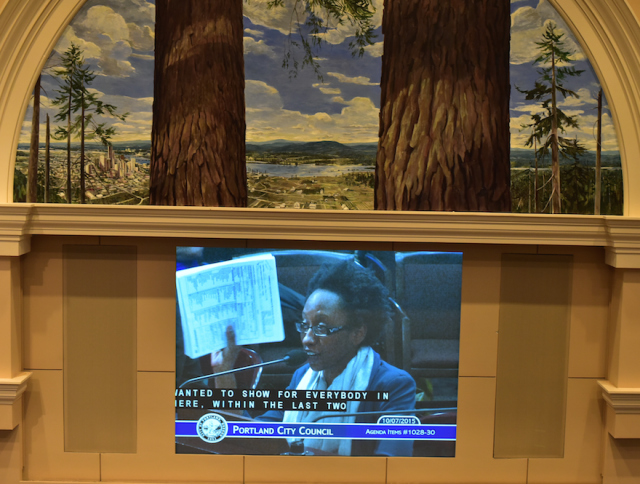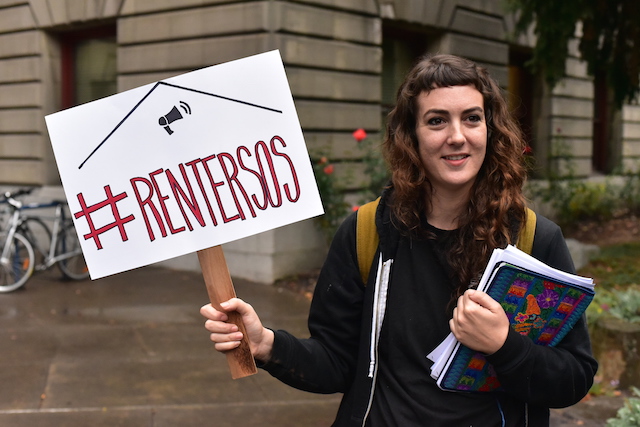The Portland City Council unanimously passed an ordinance declaring a housing state of emergency in the city on Wednesday. The ordinance theoretically paves the way for steps to ease the housing crisis affecting a large swathe of people who rent housing, as well as those experiencing houselessness, stating in one section that, “It is appropriate for the Council to declare a housing emergency to allow for temporary housing, emergency mass shelters and day storage units to serve the homeless.” In addition, the Council authorizes the Bureau of Emergency Management Director to ask Governor Kate Brown to declare a housing emergency in Portland.tr5
The clinical language of the ordinance belies the suffering many Portlanders are experiencing as meteoric rent increases have resulted in displacing them, their families, and their friends, thereby devastating the communities they once called home. Their stories, some given in testimony before the Council, highlight the state of emergency, but also show that the steps currently being considered by the Council are terribly inadequate.
On September 15 the Community Alliance of Tenants (CAT) declared a renters state of emergency. The CAT, which bills itself as a statewide, grassroots, tenant-led, renters’ rights organization thay works to empower tenants to demand and obtain safe, stable, and affordable housing, insisted the City declare a one year moratorium on no-cause evictions and require one year’s notice on rent increases of over 5%.
Commissioner Dan Saltzman quickly responded with proposals that very weakly mirror the CAT’s demands. Those motions, which Saltzman announced on Wednesday call for renters receiving 90 day notice for no-cause evictions, as well as when a landlord wishes to increase the rent by over 10%. Saltzman describes these proposals as “a safety valve for tenants” that were inspired by the ideas of the CAT. They may have been inspired by the CAT, but they fall far short of its demands. It was Saltzman’s proposals that formed the backdrop to most of Wednesday’s council testimony.
 “It’s a step in the right direction,” said Katrina Holland, Deputy Director of the CAT at a rally outside City Hall prior to the session. “But we need more. We can send a loud message (today) that says, ‘Thank you for the proposals, but we need more. Much more.’”
“It’s a step in the right direction,” said Katrina Holland, Deputy Director of the CAT at a rally outside City Hall prior to the session. “But we need more. We can send a loud message (today) that says, ‘Thank you for the proposals, but we need more. Much more.’”
A small step toward the CAT’s demands was taken when Commissioner Amanda Fritz proposed an amendment making the 90 day notice for rent increases apply to a raise of more than 5%. The amendment passed with only Saltzman opposed.
Saltzman also stated that at the end of the month he would propose a demolition fee on developers who destroy old housing to build new dwellings. It remains unclear how Saltzman’s proposals will stem the crisis. Saltzman–along with other council members and City attorneys–expressed worry that if the proposals went further, they would be perceived as rent control and struck down in court as a violation of state law.
Tenants, landlords, and representatives for landlord trade groups also testified. At times it seemed people came from two different worlds, one requiring immediate and bold solutions to a problem that is ravaging people’s lives, and another where the only problem is that government is already meddling too much in the free market, and that if it would just loosen up regulations, more housing would be built and the problem would be solved.
Justin Buri, Executive Director of the CAT, spoke passionately about the challenges and suffering that renters are enduring. Noting that Portland is already “one of the most gentrified cities in the nation and has among the highest rates of rent increases and no-cause evictions,” Buri stated that landlords and developers issuing these evictions and dramatically increasing rents “are forcing responsible and reliable tenants out of housing, into one of the worst rental markets in history, without considering the impact on the individual tenants, or our community.”
He went on to say that the low vacancy rate in Portland gave “landlords more power over tenants, increasing incidents of discrimination and retaliation” which presented renters with challenges “especially dire for tenants with high barriers, and members of protected classes under the federal Fair Housing Act.” Buri then asked the commissioners to imagine themselves facing the hardships Portland renters currently are experiencing. After running through a litany of these challenges–including finding new housing on short notice while working a minimum wage job for far longer than 40 hours a week, raising a family, paying all the costs associated with finding and moving to a new place–Buri asked the council, “How long would that process take for you? Is 30, 60, 90 days enough? Do you have the money in your savings to do that? For the majority of tenants the answer is no.”
“Low income tenants, people of color, people with disabilities, working families making poverty wages, and seniors on a fixed income are being told, ‘If you don’t like it, move,’” Buri said, “which really means, ‘You are no longer welcome to live in this city.’”
He then reiterated the demands of the CAT, stating, “We can no longer wait for incremental change, or accept the bread crumbs that are thrown to us, so we can count that as a win. If the intent of this 90-day proposal is to act as a first step and building block to real change, and have the commitment of this Housing Commissioner, mayor, and council, of enacting real immediate change, then we can support it. If the intent of this 90-day proposal is to say that you all have done something, and then go back to business as usual, then we cannot support it.”
Buri closed by urging the council to “demonstrate the courage and leadership necessary to either change or challenge” the preemptions of Oregon state law that do not allow cities to craft their own rent control rules. “Those unjust laws and policies should be challenged, just as landlords will challenge this modest, meager proposal.”
 Saltzman’s proposal was, in fact, challenged by most of the people who gave testimony. Numerous tenants, often with steep emotion, talked about their hardships.
Saltzman’s proposal was, in fact, challenged by most of the people who gave testimony. Numerous tenants, often with steep emotion, talked about their hardships.
Keith Schultz, a disabled Gresham resident who has lived in Portland for 41 years, saw the apartment complex in which he has lived for 10 years sold to a Colorado company that went on to enact exorbitant rent increases which displaced many of his neighbors. Schultz worries he might be next. “Where are we supposed to go?” he asked the commissioners, a question echoed by many others.
Misty, who is on disability and a subsidized housing program has seen her rent increase from $844 to $959 a month. “We’re gonna be out on the streets with nowhere to go.”
Linda Lloyd rents a mobile home. An investor bought her home forcing her to spend 90% of her fixed income on rent. Like many of the people who testified, Lloyd comes across as a person who has spent her life playing by the rules, and now finds herself getting plowed under by the very people who make those rules. “My retirement,” she said, fighting back tears, “has been fighting a no-cause eviction.”
A woman whose name was inaudible stated her rent had gone up by $400, nearly 40%. “It’s so inhuman to push people out,” she said. “If the law isn’t serving us, and it seems we are serving it, we need change.” She also told the council that renters should “be at the discussion table, not talked about.”
“You need to hear the voices of us,” said a woman named Carolyn. “We’ve heard you enough.” Her statement held resonance in a council meeting whose subject was the crisis being faced by renters, yet took over 90 minutes of various other deliberations and consultations before allowing those renters to speak. Indeed, numerous people who had signed up to give testimony that they thought was to start at 2 PM were forced to leave because of other obligations.
“The rental packages that have been proposed are just band-aids,” said local activist Joel Spector. “But we need band-aids to stop the bleeding.” He then said that the commissioners needed to break out of the “small scale thinking” of Saltzman’s proposal listen to the community to which Commissioner Nick Fish retorted that Saltzman’s ideas were drawn from the community. While technically true, the scope of the ordinance seems woefully inadequate when balanced against renter needs.
Sixty-year-old June Johnson said the rent in her low-income housing had risen $350 a month, an amount she cannot afford and for which she will need a cosigner who must make at least $5000 a month. “I’m lost, I’m stuck,” she said.
 Margot Black, is 36-years-old, and married with 3 children. She and her husband make “slightly above the median income.” After her allotted time had expired, Mayor Hales attempted to stop her explanation as to why her family has difficulty making ends meet, but Black would have none of it, saying she had sent emails unanswered emails with this information to the mayor’s office. “I want it on the record!” she shouted at Hales. She soon finished, asking the council who could afford to live in Portland if she and her family could not.
Margot Black, is 36-years-old, and married with 3 children. She and her husband make “slightly above the median income.” After her allotted time had expired, Mayor Hales attempted to stop her explanation as to why her family has difficulty making ends meet, but Black would have none of it, saying she had sent emails unanswered emails with this information to the mayor’s office. “I want it on the record!” she shouted at Hales. She soon finished, asking the council who could afford to live in Portland if she and her family could not.
Holland then talked about calls received by the CAT hotline from people regarding excessive rent increases and no-cause evictions. She held up about 100 pages of documentation gathered since July and read about 15 of them which detail the struggles of choosing between paying high rent, food, or medicine, as well as people trying to figure out to find a new place when faced with a short time line on a no-cause eviction.
Jessie Sponberg talked about how the housing crisis did not arise from nowhere, but that it was the product of a council–particularly those who had served on it for so long, a comment seemingly aimed at Fish and Saltzman–that had done nothing except help create and exacerbate the problem. Just prior to Sponberg, Fish had spoken about earlier testimony in which the speaker talked about the council members less than kindly, exalting how wonderful it was that people had the right to speak before the commissioners. Yet, when Sponberg was making his points, Fish kept interrupting him. This resulted in an expletive-laced tirade from Sponberg that for some may have obfuscated his valid points about the housing crisis being a systemic problem.
Brent Ari Rosenthal, who spoke just after Sponberg, perhaps summed up Sponberg’s thoughts. “Fuck money,” he said. “This is about flesh and blood life.”
A few landlords also testified. Longtime landlord Wayne Stoll stated he never gave a no-cause eviction in order to raise the rent, using it only for people “who do not live by the standard code of society.” Stoll stated he “agonized” over even 3 to 5% wage increases, saying, “We don’t raise rent just to raise rent.” Fritz asked Stoll if he was opposed to the 90-day notification for rent increases. Stoll was not. Fritz asked if he would oppose the 90-day notification for rent increases of more than 5% instead of Saltzman’s proposed 10. Again, Stoll said he would not.
Similar to Stoll, Jessica Blakely came across as what she termed “a responsible landlord.” She stated that that she too never used no-cause evictions to raise rents. She thought a 60-day period for no-cause evictions, the standard for people who have lived in a place for more than a year, (30-days notice applies to those under a year) was acceptable, as was 90 days if a building was being swept “to push a large amount of people out the door.” When asked how much her rents had increased over the past year, she demurred on giving details, stating only that of the over 2,000 units she owns between Portland and Seattle, the rates of the ones in Vancouver increased 5 to 10 percent.
 While Stoll and Blakely seem to be reasonable people concerned with their tenants as people, the same could not be said for those who represent landlords on a mass level. Deborah Imse of Multifamily Northwest, which bills itself as “The Association Promoting Quality Rental Housing,” essentially stated the renters crisis was not a social or people problem, but a market problem that needed a market solution.
While Stoll and Blakely seem to be reasonable people concerned with their tenants as people, the same could not be said for those who represent landlords on a mass level. Deborah Imse of Multifamily Northwest, which bills itself as “The Association Promoting Quality Rental Housing,” essentially stated the renters crisis was not a social or people problem, but a market problem that needed a market solution.
The same cold argument was also taken up by Cindy Robert, a lobbyist for the Rental Housing Association. Robert, who said that changing the regulations to which landlords must adhere “does not lead to more housing” called upon what has become one of the popular, if highly disputed, points embraced by landlords–that rent control makes people want to leave where they live because it makes it more difficult to evict people causing trouble.
She also stated that landlords are not in their line of work because they want to make money, implying instead that they rented houses and apartments solely because they wanted to provide people with safety. Saying that landlords are good people for the most part, victimized by “bad actors,” Robert expressed dismay that landlords were under attack, as if they were the ones suffering during this housing crisis.
Another spokesperson for landlords talked about how much landlords sacrifice in terms of receiving paltry tax breaks, having to pay taxes, shelling out money for upkeep on units, and being forced to obey all sorts of regulations.
Prior to entering City Hall, a woman named Tabitha displayed a letter from her management company showing her rent renewal options. Tabitha rents a 1 bedroom unit in an apartment complex in Gresham for $885 a month, with utilities boosting it to a total of $942.50. Tabitha was presented with 3 options that would result in an increase ranging between $270 and $470 a month, representing a 30 to 53 percent increase in her rent.
Tabitha, who has lived in Gresham for almost 40 years, has never seen her rent increase by more than $50 a month. She says if she wants to keep living in her apartment–emphasizing that by living she means surviving–she will need to borrow money. “I don’t know where to go,” she said. “I have no idea what to do.”
Want to get involved? Visit the Community Alliance of Tenants webpage at: http://www.oregoncat.org.







